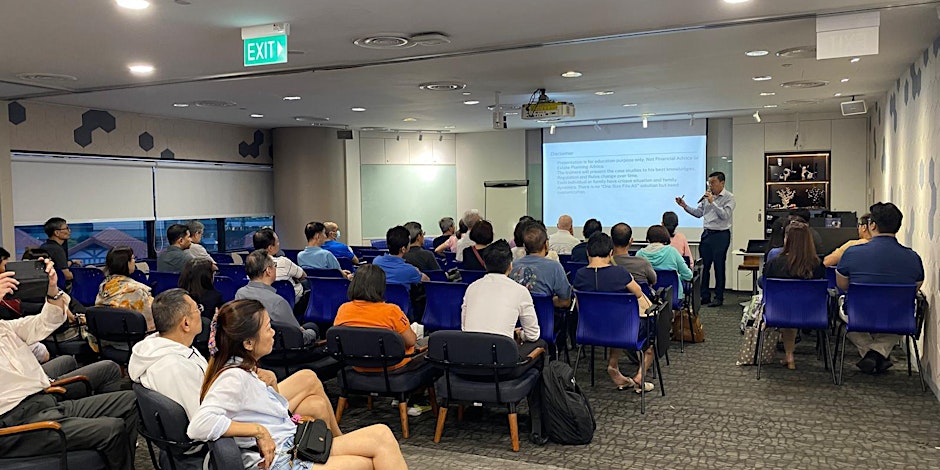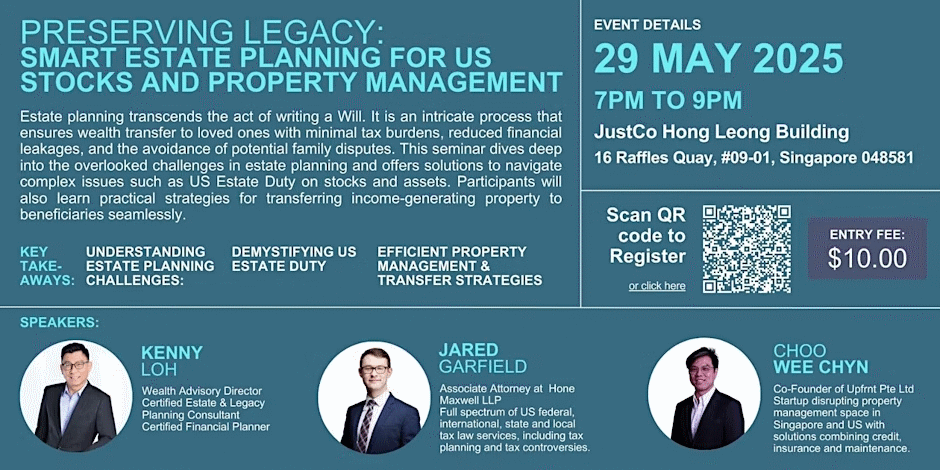Navigating the Complexities of Digital Asset Estate Planning: Ensuring a Seamless Transfer
Join us for an insightful event where we will delve into the intricacies of digital asset estate planning. Learn how to safeguard your online assets and ensure a smooth transfer to your loved ones. Our experts will guide you through the process, providing valuable tips and strategies along the way. Don’t miss out on this opportunity to secure your digital legacy! This event is free to attend, but registration is required.
Event Location: 80RR Fintech Hub SG
Time: 7:30pm – 9:30pm

Key Takeaways:
- Challenges of Estate Planning in New Era: Understand the new threat in our wealth distribution and how our estate can fall into the wrong hand.
- Basics of Asset (ABCD) Distribution: Understand the fundamental principles of asset distribution.
- US Federal Estate Tax Implications: Discover the tax liability and implication on US stock investments and Digital Assets.
- Digital Asset Wealth Transfer: Discover ways to protect or transfer your Digital Assets to your loved ones in a seamless way.
Join us to gain valuable insights into estate planning and take the first step towards effectively guarding your wealth. No prior knowledge is required, and all are welcome.
Registration starts at 7:00pm.
Speakers Profile
Mr. Kenny Loh is a Certified Estate & Legacy Planning Consultant and also a CERTIFIED FINANCIAL PLANNER (CFP). Kenny has more than 10 years in Holistic Estate Planning experience, using a unique “3-in-1 Will, LPA and Standby Trust” solution, to address his client’s social consideration, legal obligation, emotional needs and family’s harmony in his approach. Kenny has Double Master degree in Business Administration and Electrical Engineering, and also an AEPP (Associate Estate Planning Practitioner) jointly awarded by The Society of Will Writers & Estate Planning Practitioners (SWWEPP) of The United Kingdom, in collaboration with Estate Planning Practitioner Limited (EPPL), the accreditation body for Asia.
LinkedIn: https://www.linkedin.com/in/kennyloh-investment-retirement/
Personal Profile: https://engage.fa.com.sg/author/kennyloh/
Mr.Adrian Chng is the Founder and CEO of Fintonia Group, a MAS licensed financial institution based in Singapore. In 2021, Fintonia Group launched the first institutional grade BTC tracker fund in Asia managed by a MAS-licensed fund manager and was awarded the provisional VARA licence in Dubai in July 2022.
With over 25 years of experience as a business leader, Adrian is particularly involved in the FinTech and digital asset industries. He co-founded two FinTech companies (CredoLab and Asia Kredit), and sits on the boards of numerous organisations.
Prior to Fintonia Group, Adrian was the CEO of jobsDB.com, which had a US$1 billion merger and exit in 2014, and CEO of GoBear amongst other leadership roles across the finance and technology sectors. He started his career as an M&A investment banker with Merrill Lynch and SBC Warburg (UBS). Adrian is an Executive Committee member of the Singapore FinTech Association and a member of the Young Presidents Organisation.
LinkedIn: https://www.linkedin.com/in/adrian-chng-cy/
Website: https://www.fintoniagroup.com/
Mr. Timmoney Ng is a Partner of Charles Russell Speechlys. As a US tax lawyer based in Singapore, Tim advises international startup companies, fund investors, and large multinational corporations in the tech, life sciences, semiconductor, and crypto/blockchain space. Tim’s practice focuses on US tax planning and controversies regarding passive foreign investment companies (PFIC), controlled foreign corporations (CFC), funds/partnerships, global intangible low-taxed income (GILTI), subpart F income, foreign-derived intangible income (FDII), foreign tax credits (FTC), US trade or business (commonly known as US tax nexus), qualified small business stock (QSBS), US real estate investments (FIRPTA), and transfer pricing. Tim earned his Juris Doctorate from the University of California, Berkeley, School of Law (Berkeley Law) and is a US-qualified lawyer, having passed the California Bar Exam.
LinkedIn: https://www.linkedin.com/in/timmoney-ng-b25b0163/




